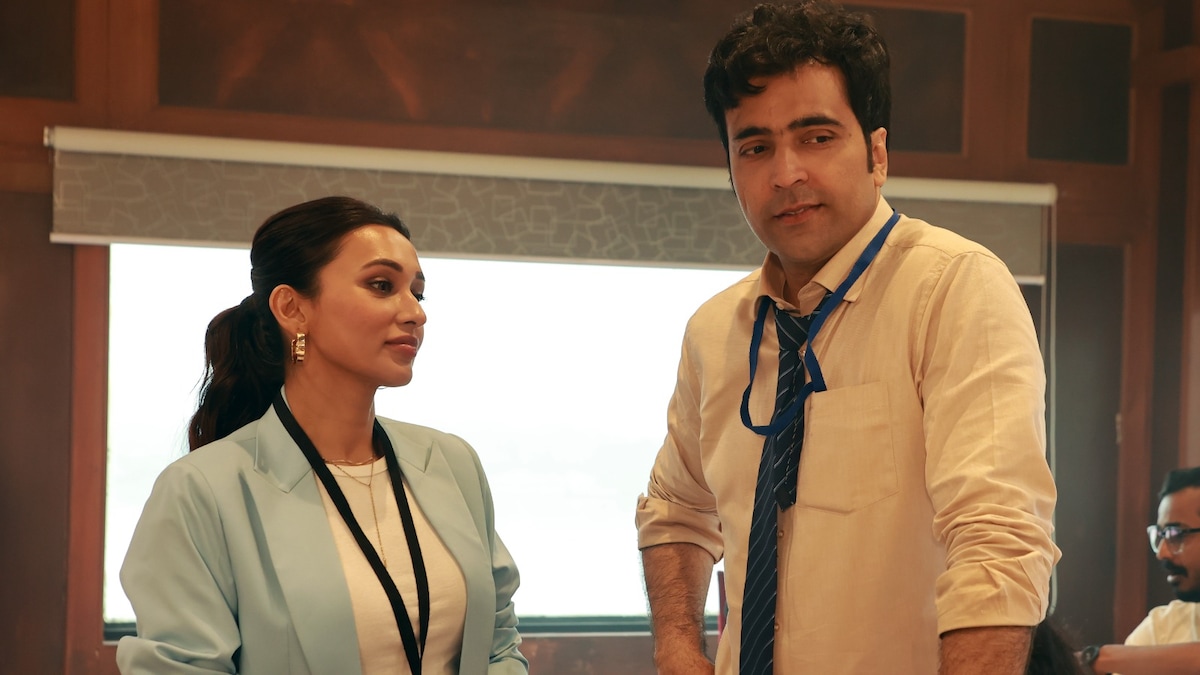Alaap review: Mimi Chakraborty, Abir Chatterjee and Swastika Dutta’s drama is modern love in new-age Kolkata
Alaap review: Mimi Chakraborty, Abir Chatterjee and Swastika Dutta’s drama is modern love in new-age Kolkata
Apr 27, 2024

Mimi Chakraborty and Abir Chatterjee from a scene of Alaap
Alaap story:
Pablo Majumder, aka PM (Abir Chatterjee), and Aditi Mitra, AM (Mimi Chakraborty), share the same flat. One works at night and sleeps in the morning and the other works in the morning and stays at home at night. One goes to their parents during the weekend. As a result, PM and AM never meet. After the hilarious episode of finding that they are of the opposite gender, they form, possibly unknowingly, a cohabitable space in that flat. They share food, newspapers, cacti, and life and yet remain unknown to each other.
Alaap review:
Alaap is essentially a romantic drama that is sprinkled abundantly with humour. It is also a film that brings love’s old-school charm and new-age dilemmas together. As a result, Premendu Bikash Chaki’s film becomes a refreshing love story that touches hearts.
First thing first, it is a well-written script. While the plot follows a dangerously close proximity with Beth O'leary's Flatshare, the characters are dearly convincing and anyone can find themselves in their shoes. From Aditi’s late attendance to Pablo’s pesky-yet-loving mother and his less combative father – each bit has the touch of Bangaliana. Chaki and the co-writer Padmanabha Dasgupta have captured the ‘Sector V’ crises and blended them well with the conventional ideas through the characters and their interaction. When Bhadra Basu, PM’s neighbour, gets flabbergasted after hearing his annual pay package and takes it for granted that AM and PM are married, we see our elder generation reacting through her voice. Through Bhadra Basu’s character, though not elaborately, Chaki also touches upon the growing numbers of elderly populations living alone in Kolkata – a social trend that has spread like wildfire in the city.
And then there is Sukhlal – played outstandingly by Rohit Gupta. He drives the comedy throughout the first half of the film. Abir, Mimi, and others contribute to it to make it a pleasurable watch. The film falters a little in the second half. However, the ending smoothens it so well that a little bit of faltering does not matter anymore.
Abir and Mimi are gorgeous together. Their characters barely meet but there is something unexplainable – perhaps the script – that helps their chemistry flourish. Abir looks so much at ease in playing an ordinary man who is not busy solving murders and finding treasures. With twitching eyes and the typical Bengali ‘cluelessness’, he looks so refreshing that it seems that someone has taken off a load of being smart all the time. PM is a regular boy and Abir plays him effortlessly.
Aditi is what a modern Bengali girl behaves like. And Mimi captures it brilliantly. AM is smart and independent. She knows how to save her job but is not sure of how she wants her relationship to be. Mimi looks beautiful on screen and reflects Aditi’s dilemma well. Swastika Dutta (who plays Swatilekha) is so much better than her previous works. Interestingly, AM and Swatilekha are poles apart in their worldviews and that is shown very subtly through their wardrobe choices. AM, an outspoken one, is seen in shorts, racerbacks, and well-cut western outfits. She hops from one stop of her career to the other organically. Swati, on the other hand, chooses kurtis with scarves and decides to move to a new city as her post-marriage career plan. What is delightful is that the film shows a non-judgmental and non-preachy take on both characters. This is rather a rare trait in Bengali films.
Music is also a forte in the film. The songs – beautifully composed by Anupam Roy – are an integral part of the film’s narration. The songs tell stories, emphasise the characters, and help in building chemistry between the lead pair. Prabuddha Banerjee’s BGM is sublime. It is never overt and yet leaves a lasting impact. The film moves around the glass-and-chrome jungle of Sector V and not for once it looks boring. The interval shot deserves a round of applause.
Watch 50k+ Titles on SonyLiv, Zee5, Fancode and 20+ OTTs and 250+ Live TV channels with OTTplay Premium subscription at just ₹75 for the first month.
Alaap verdict:
Alaap is the film that you were waiting for. It is a contemporary love story handled maturely and presented on a platter full of care. It is relatable sans an iota of melodrama. AM and PM complete the circle of life. Does that always mean they will have to walk hand in hand? Can they meet and move on? Those are the thoughts that linger long after the film. It is a must-watch. It is also a reassurance that good Bangla films do happen.
Share